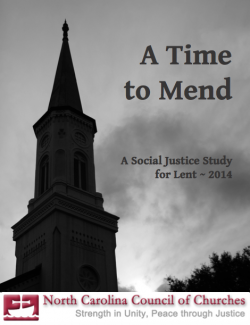 In recognition of our faithful call and of this time in history, the Council’s annual Lenten guide focuses on poverty and the ways we can respond to our sisters and brothers of low-income. We hope you and your family will find cause for reflection and inspiration for action as you share this intergenerational resource together. May we continue building as a nation toward a place where God’s love is felt by everyone through the meeting of basic human needs and the extension of true opportunities for progress.
In recognition of our faithful call and of this time in history, the Council’s annual Lenten guide focuses on poverty and the ways we can respond to our sisters and brothers of low-income. We hope you and your family will find cause for reflection and inspiration for action as you share this intergenerational resource together. May we continue building as a nation toward a place where God’s love is felt by everyone through the meeting of basic human needs and the extension of true opportunities for progress.
Click here to download “A Time to Mend: A Social Justice Study for Lent.”
Scripture: Psalm 24:1-2 (NRSV)
The earth is the Lord’s, and everything in it,
the world, and all who live in it;
for he founded it on the seas
and established it on the waters.
Social Justice Reflection
We expect clean air and water to be plentiful. They are, after all, fundamental parts of God’s great creation.
But the threats we pose to our planet and its resources are scientifically undeniable. We humans have proven to be careless in our treatment of the environment, frighteningly efficient in its destruction. And, as in so many cases, the burden of our actions falls disproportionately on the poor.
The coal ash spill in the Dan River has drawn international attention in recent weeks. Coal has for years been burned at a Duke Energy power plant in Eden, and the residual ash had been dumped into a holding pond nearby. In early February a pipe running beneath the pond collapsed, leaking thousands of tons of toxic coal ash and millions of gallons of contaminated water into the river. The coal ash has already flowed some 70 miles down the Dan, and public health officials are warning people not to touch the water or eat the fish.
Attracting less attention, a group of residents in the Royal Oak community of Brunswick County has worked against a different contamination threat in recent years. As the county has grown, it has chosen to truck construction and waste products away from gated luxury destinations and to a landfill established in the small, overwhelmingly poor community settled by freed slaves.
Residents, who have been denied water and sewer service from the government, live with the smell, tainted water, and associated health concerns. When the county sought to expand the dump in recent years, the people of Royal Oak began working with the UNC Civil Rights Center to stop it.
Like many who bear the pressing burden of our environmental mistakes, it appears the most egregious thing anyone in the community did was be poor.
Read the description of the Garden of Eden in Genesis. It is a story marked by God’s abundant generosity intended to be shared by us all. God gave us dominion over this planet with the expectation that we would serve as caregivers. Likewise, the expectation is clear that we will care for one another. When humans damage the earth and seemingly direct the first and worst impact of that damage at those least able to counter it, we have doubly betrayed our responsibility.
Closing Prayer
Creator God, you have gifted us with land, sea and sky, and with all their inhabitants. Forgive us the choices that have damaged your precious creation and for the harm done our sisters and brothers who suffer first. Help us to build a sustainable way of life that honors your gifts to us and our responsibility to each other. Amen.
Links
- www.ncipl.org
- www.ncconservationnetwork.org
- www.crpe-ej.org
- www.greenfaith.org
Intergenerational Questions
Most kids learn about the environment, recycling, and the science of creation care in school. It is very important that you help them make the connection of all of those facts to their faith.
Explain that God created a “good” earth and made us the caretakers. Explain that all land and all water belong to God, and it is important that we make good decisions so that everyone can have clean water, abundant food and safe and healthy living conditions.
Explain that God loves every creature that he created and wants us to do the same. Read Matthew 25:40 where Jesus said “And the King will answer and say to them, Truly I say to you, to the extent that you did it to one of these brothers of Mine, even the least of them, you did it to Me. Talk about the coal ash spill that has been in the news and the impact that it has on everyone’s well-being.
Talk with your children about ways that your family can care more for creation and make a difference.
Intergenerational Activities
- As a family, join in a community clean-up in a local park or stream. It could be a fun contest to see who could bring back the most trash.
- Plant a tree. Martin Luther is said to have stated that if the world were to end tomorrow, he would plant a tree.
- Collect items to be recycled. Newspapers, cans, bottles, ink cartridges, batteries, and cell phones can all be recycled.
- Start to compost. Returning decomposing plant-based food waste to the earth can be a beautiful metaphor for resurrection.

